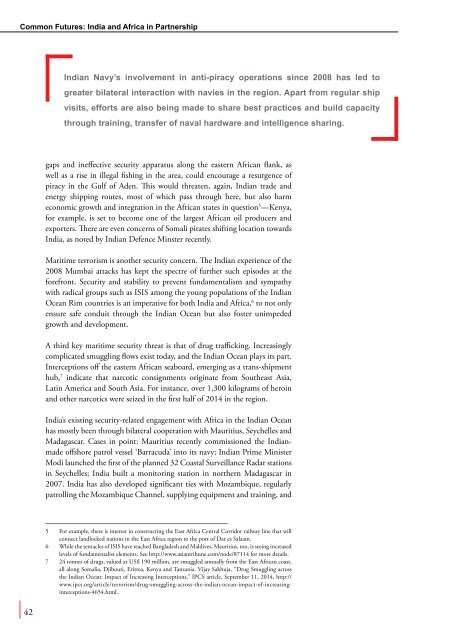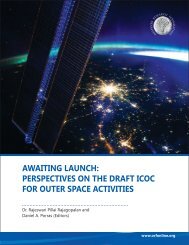Common Futures
II3UUw
II3UUw
You also want an ePaper? Increase the reach of your titles
YUMPU automatically turns print PDFs into web optimized ePapers that Google loves.
<strong>Common</strong> <strong>Futures</strong>: India and Africa in Partnership<br />
Indian Navy’s involvement in anti-piracy operations since 2008 has led to<br />
greater bilateral interaction with navies in the region. Apart from regular ship<br />
visits, efforts are also being made to share best practices and build capacity<br />
through training, transfer of naval hardware and intelligence sharing.<br />
gaps and ineffective security apparatus along the eastern African flank, as<br />
well as a rise in illegal fishing in the area, could encourage a resurgence of<br />
piracy in the Gulf of Aden. This would threaten, again, Indian trade and<br />
energy shipping routes, most of which pass through here, but also harm<br />
economic growth and integration in the African states in question 5 —Kenya,<br />
for example, is set to become one of the largest African oil producers and<br />
exporters. There are even concerns of Somali pirates shifting location towards<br />
India, as noted by Indian Defence Minster recently.<br />
Maritime terrorism is another security concern. The Indian experience of the<br />
2008 Mumbai attacks has kept the spectre of further such episodes at the<br />
forefront. Security and stability to prevent fundamentalism and sympathy<br />
with radical groups such as ISIS among the young populations of the Indian<br />
Ocean Rim countries is an imperative for both India and Africa, 6 to not only<br />
ensure safe conduit through the Indian Ocean but also foster unimpeded<br />
growth and development.<br />
A third key maritime security threat is that of drug trafficking. Increasingly<br />
complicated smuggling flows exist today, and the Indian Ocean plays its part.<br />
Interceptions off the eastern African seaboard, emerging as a trans-shipment<br />
hub, 7 indicate that narcotic consignments originate from Southeast Asia,<br />
Latin America and South Asia. For instance, over 1,300 kilograms of heroin<br />
and other narcotics were seized in the first half of 2014 in the region.<br />
India’s existing security-related engagement with Africa in the Indian Ocean<br />
has mostly been through bilateral cooperation with Mauritius, Seychelles and<br />
Madagascar. Cases in point: Mauritius recently commissioned the Indianmade<br />
offshore patrol vessel ‘Barracuda’ into its navy; Indian Prime Minister<br />
Modi launched the first of the planned 32 Coastal Surveillance Radar stations<br />
in Seychelles; India built a monitoring station in northern Madagascar in<br />
2007. India has also developed significant ties with Mozambique, regularly<br />
patrolling the Mozambique Channel, supplying equipment and training, and<br />
5 For example, there is interest in constructing the East Africa Central Corridor railway line that will<br />
connect landlocked nations in the East Africa region to the port of Dar es Salaam.<br />
6 While the tentacles of ISIS have reached Bangladesh and Maldives, Mauritius, too, is seeing increased<br />
levels of fundamentalist elements. See http://www.asiantribune.com/node/87114 for more details.<br />
7 24 tonnes of drugs, valued at US$ 190 million, are smuggled annually from the East African coast,<br />
all along Somalia, Djibouti, Eritrea, Kenya and Tanzania. Vijay Sakhuja, “Drug Smuggling across<br />
the Indian Ocean: Impact of Increasing Interceptions,” IPCS article, September 11, 2014, http://<br />
www.ipcs.org/article/terrorism/drug-smuggling-across-the-indian-ocean-impact-of-increasinginterceptions-4654.html.<br />
42








